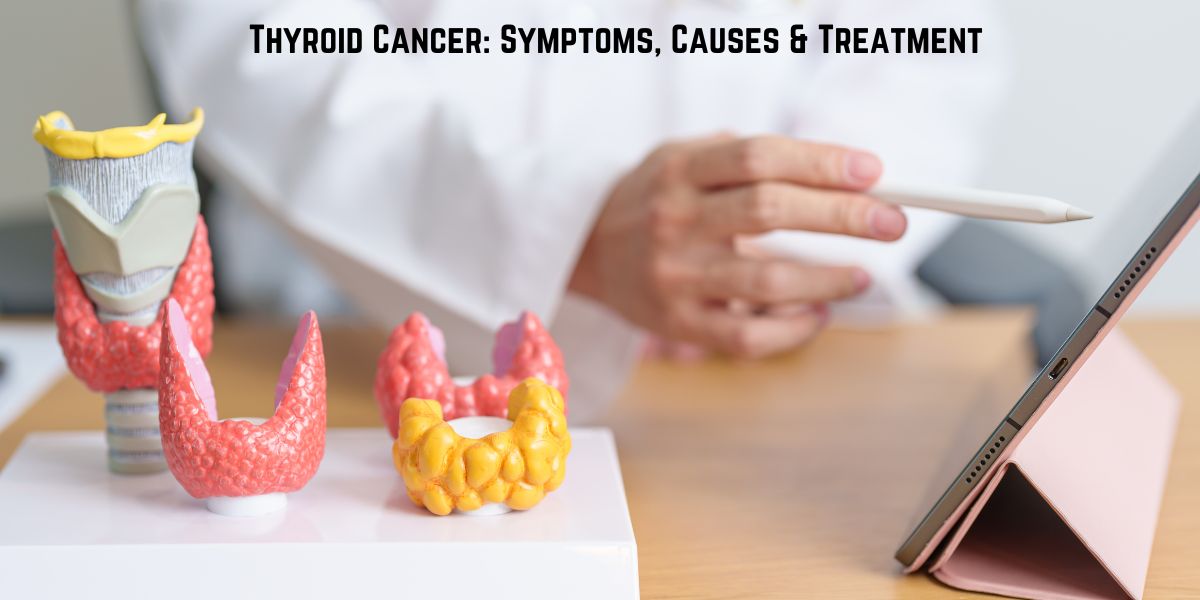BLOG
Thyroid Cancer Symptoms, Causes & Treatment

Thyroid cancer is a type of cancer that originates in the thyroid gland, a small butterfly-shaped gland located in the neck, just below the Adam's apple. While relatively rare compared to other types of cancer, thyroid cancer is one of the most common cancers of the endocrine system, which includes the glands that produce hormones. Understanding the symptoms, causes, and treatment options for thyroid cancer is crucial for early detection and effective management of this condition.
Symptoms
Thyroid cancer often presents few or no symptoms in its early stages, making it challenging to detect. However, as the cancer progresses, some common signs and symptoms may appear. These can include
Lump or swelling in the neck
The most common sign of thyroid cancer is the presence of a lump or swelling in the neck, known as a thyroid nodule. While most thyroid nodules are benign, it's essential to have any unusual swelling or lump evaluated by a healthcare professional.
Hoarseness or voice changes
Thyroid nodules or tumors can sometimes affect the vocal cords, leading to hoarseness or changes in voice quality.
Difficulty swallowing or breathing
As thyroid cancer grows, it may exert pressure on the nearby structures in the neck, causing difficulty swallowing or breathing.
Persistent cough
A persistent cough that is not related to a cold or respiratory infection may be a sign of thyroid cancer, especially if it is accompanied by other symptoms.
Neck pain
Some individuals with thyroid cancer may experience pain or discomfort in the neck, particularly around the site of the tumor.
It's important to note that these symptoms can also be indicative of other thyroid conditions or non-cancerous nodules. However, anyone experiencing these symptoms should seek medical evaluation to determine the underlying cause.
Causes
The exact cause of thyroid cancer is not always clear, but several risk factors may increase an individual's likelihood of developing the disease. These risk factors include
Gender: Thyroid cancer is more common in women than in men, with women being three times more likely to develop the disease. The reason for this gender disparity is not fully understood but may be related to hormonal factors.
Age: Thyroid cancer can occur at any age, but it is most commonly diagnosed in people between the ages of 30 and 60.
Exposure to radiation: Exposure to high levels of radiation, particularly during childhood or adolescence, is a significant risk factor for thyroid cancer. This radiation exposure may come from medical treatments, such as radiation therapy for head and neck cancers, or environmental sources, such as nuclear fallout.
Family history: Individuals with a family history of thyroid cancer or certain hereditary conditions, such as multiple endocrine neoplasia type 2 (MEN2) or familial medullary thyroid cancer, have an increased risk of developing the disease.
Iodine deficiency or excess: While uncommon in regions with sufficient iodine intake, both iodine deficiency and excess iodine intake have been associated with an increased risk of thyroid cancer.
Certain genetic mutations: Changes (mutations) in specific genes, such as the RET proto-oncogene or the BRAF gene, can increase the risk of developing thyroid cancer.
Treatment
The treatment approach for thyroid cancer depends on various factors, including the type and stage of the cancer, as well as the individual's overall health and preferences. Treatment options may include
Surgery: The primary treatment for thyroid cancer is often surgical removal of the thyroid gland (thyroidectomy). In cases where the cancer is confined to the thyroid gland, a lobectomy (removal of one lobe of the thyroid) may be sufficient. In more advanced cases or if there is a high risk of recurrence, a total thyroidectomy may be recommended.
Radioactive iodine therapy: After surgery, radioactive iodine therapy may be used to destroy any remaining thyroid tissue or cancer cells. This treatment is particularly effective for certain types of thyroid cancer that absorb iodine, such as papillary and follicular thyroid cancer.
Thyroid hormone replacement therapy: Following thyroidectomy, individuals will need to take thyroid hormone replacement medication (levothyroxine) for the rest of their lives to replace the hormones normally produced by the thyroid gland.
External beam radiation therapy: In some cases, external beam radiation therapy may be used to target and destroy cancer cells, particularly if the cancer has spread beyond the thyroid gland or if surgical removal is not possible.
Chemotherapy: Chemotherapy is not typically used as a primary treatment for thyroid cancer but may be recommended in cases of advanced or aggressive cancer that does not respond to other treatments.
Targeted therapy: Targeted therapy drugs, such as tyrosine kinase inhibitors, may be used to treat advanced or metastatic thyroid cancer that is not responding to other treatments.
In addition to these conventional treatment options, individuals with thyroid cancer may also benefit from supportive therapies, such as nutritional counseling, speech therapy (if vocal cord function is affected), and emotional support through counseling or support groups.
conclusion
thyroid cancer is a relatively rare but treatable form of cancer that originates in the thyroid gland. While the exact cause of thyroid cancer is not always known, several risk factors have been identified. Early detection and treatment are crucial for improving outcomes and reducing the risk of complications. If you experience any symptoms associated with thyroid cancer or have risk factors for the disease, it's essential to consult with a healthcare professional for evaluation and appropriate management drugs

